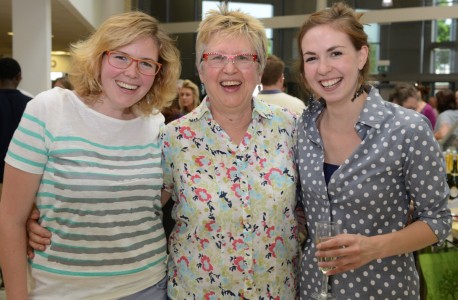Archived
Please note, this page may contain outdated information or subject matter.
Dr Maggie Woodhouse OBE gives us a unique insight into her rewarding work helping children with Down syndrome see better and the vital role Action Medical Research plays in supporting her research…

Dr Woodhouse pictured left and with research team members Flors and Steph
What inspired you to investigate this particular area?
In the late 1990’s my colleagues and I were interested in squints and lazy eyes and decided to open a children’s clinic. We got a bit of publicity for it in the local paper and, to our surprise, started to see children with disabilities. Until then we had no idea of the unmet need for eye care among children with special needs. Of course, our patients included children with Down syndrome and I became more and more fascinated by the unexpected eye problems we were encountering. And I discovered what enormous fun there is to be had in testing children!
What does Action funding for this study mean to you?
It means that we can continue our studies with children with Down syndrome. There is so much more we need to know about how they see before we can really understand how best to help. And it also means working with the team at Action to promote the research and feel we belong to a dedicated community. Action does not simply hand over the money and sit back and wait for annual reports. They are with us every step of the way.
What does a typical day look like for you … or is every day different?
If every day were the same I would have retired long ago! My favourite days are clinic days when I see children and adults with special needs. And guess what: every patient is different too. It means staying on my toes and thinking up ways to keep my patient engaged with the eye examination. I also enjoy days when the team gets together to discuss results and plan the next steps; seeing the results emerge and trying to interpret them is very exciting. I won’t talk about the days when everything goes wrong!
Can you tell us a bit about your team?
Top of the list is my co-supervisor Jon Erichsen and our post-doctoral associate Flors Navarro. Flors studied for her PhD with us and completed it just before we received the Action funding. She is very conscientious and hard-working, but great fun too. Jon is the only team member who is not an optometrist. His background is neuroscience, so he brings a solid scientific approach to the work. Also high on the list is Sue, a secretary who keeps us all in order and makes sure we keep up with the paperwork; as academics we don’t do admin willingly. The others on the team are Lee, Matt and Asma, all of whom work in eye movements and Steph who is studying the cornea in Down syndrome – a great team.
Who’s your research hero, and why?
Fergus Campbell, my PhD supervisor, was inspirational. He loved research and had so much mental energy. People used to come from all corners of the world to work with him. I tried to model my lecture style on Fergus too, informal but enthusiastic, keeping the audience interested. I hope I am half as good.
As a charity, Action began in 1952 with our founder’s quest to find a cure for polio. What led you to a career in medical research?
The desire to follow a scientific career that involved people. And really because I never wanted to leave school, so academia was the obvious choice.
Action’s loyal and lovable mascot Paddington Bear™ is very fond of marmalade sandwiches. What’s your favourite snack?
I can’t be the only interviewee to say chocolate. I don’t have a sweet tooth so I could live without cakes and biscuits, but chocolate is essential in my life.
Tell us something that will surprise us!
I’m a beekeeper.

Dr Woodhouse: a leader in her field
Maggie is an optometrist. After studying her BSc at Aston, carrying out her pre-registration year at Newcastle General Hospital and gaining her PhD in Cambridge, Maggie joined the staff at Cardiff, where she is now a Senior Lecturer.
Maggie set up the new course of Special Needs Optometry at Cardiff and runs the only primary care clinic dedicated to children and adults with special needs in England and Wales. Her main research interest is visual development in children with Down syndrome, an area she has been working in for 25 years. She has been instrumental in developing new tests and techniques to allow the assessment of vision in people with limited communication. Maggie’s additional interests are in nystagmus, visual development in cerebral palsy and the impact of visual impairment, including CVI, on education and learning.
Maggie spends a lot of her time talking about her research to parents and support groups, in training teachers and other professionals and in lecturing to optometrists and other eye care practitioners. Her research has changed practice in eye care for children and adults with disabilities and her work was recognised in the 2014 Birthday Honours List with an OBE and in 2015 with an Association of Optometrists Lifetime Achievement Award.
To find out more...
If you’d like to find out more about Dr Woodhouse’s work investigating the mysterious benefits of bifocal glasses to help children with Down syndrome, you may like to read Henry’s story.
World Down Syndrome Day is on 21 March.
